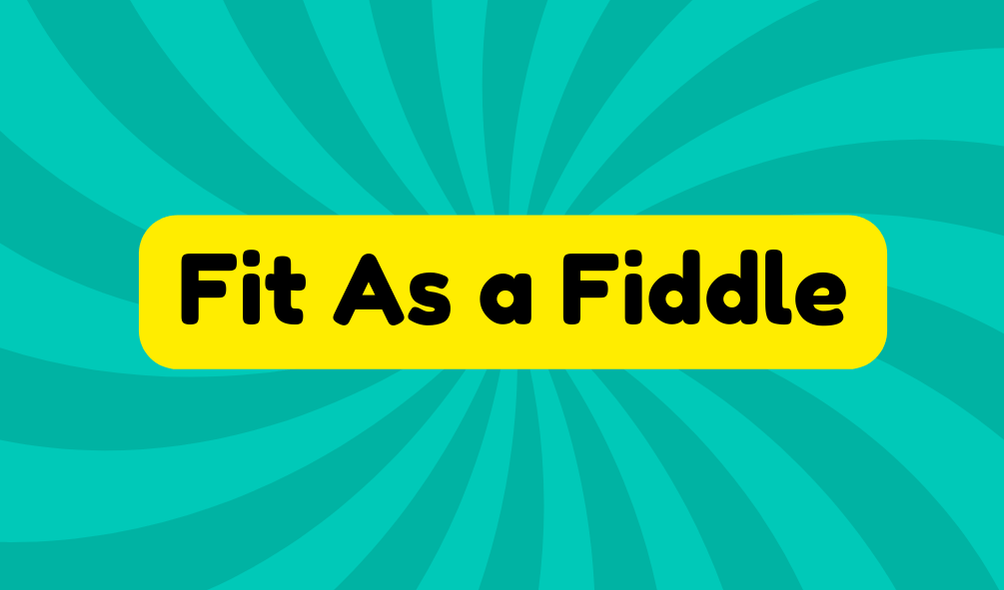The phrase "fit as a fiddle" suggests ideal health and energy, often implying a holistic approach to well-being. While its origins may relate to well-maintained instruments, the expression encourages a lifestyle that incorporates balanced nutrition and regular exercise. However, it's important to remain skeptical; not all fitness routines yield genuine health benefits. A thorough view includes mental well-being and lifestyle choices alongside physical activity. As health trends evolve, this saying remains relevant, reminding us that true fitness encompasses more than just appearance or activity levels. Explore further to uncover more insights around this enduring expression.
Synonyms
In the domain of expressions conveying good health, several synonyms can aptly substitute for "fit as a fiddle." Phrases such as "in peak condition," "fit as a lark," and "healthy as a horse" effectively capture the essence of physical fitness and overall well-being. These expressions can motivate individuals towards a healthy lifestyle but also risk oversimplifying the complex nature of vibrant health. It's essential to understand that a catchy phrase may not always reflect true well-being. Consider the following alternatives for clarity and emphasis:
- In peak condition: Suggests ideal fitness levels and performance.
- Fit as a lark: Evokes carefree vitality, yet may lack depth.
- Healthy as a horse: Implies robustness but can mislead about nuanced health issues.
Recognizing varied expressions allows for a richer dialogue around health.
Example of Sentences
Although many phrases can communicate good health, using "fit as a fiddle" in a sentence can effectively convey a sense of energy and well-being. This expression encapsulates the idea of peak physical condition and serves as a reminder of the health benefits associated with an active lifestyle. Here are a few examples:
- "After adopting a new workout routine, she feels fit as a fiddle and ready to tackle any challenge."
- "Thanks to my balanced diet, I remain fit as a fiddle, reinforcing my fitness motivation."
- "Despite his age, he still claims to be as fit as a fiddle, proving that dedication to health pays off."
These sentences highlight the importance of maintaining health and the positive mindset it fosters.
Origin
The phrase "fit as a fiddle" has a rich and somewhat ambiguous origin that reflects its enduring appeal in the English language. Etymological exploration suggests that the expression may derive from the careful maintenance associated with string instruments, particularly violins, which require precise tuning and care, much like our health. This analogy underscores the cultural significance of the phrase, linking the wellbeing of both people and instruments. The phrase's earliest recorded use dates back to the early 17th century, indicating its long-standing presence in our vocabulary. Despite this historical backdrop, the precise roots remain elusive, prompting skepticism about its original intent. Ultimately, "fit as a fiddle" continues to resonate, encouraging a proactive approach to health amid ongoing cultural dialogues.
Collocations
Collocations associated with the phrase "fit as a fiddle" enhance its meaning and application within the context of health and fitness. Understanding how these phrases intertwine with health benefits and fitness routines can provide significant insights. Here are three key collocations:
- Stay fit – A proactive approach promotes long-term wellness.
- Good health – This emphasizes the importance of maintaining a healthy lifestyle.
- Regular exercise – Integral to achieving fitness goals and sustaining well-being.
Despite the appealing notion of being "fit as a fiddle," one should remain cautious. Not all fitness routines guarantee health benefits; superficial assessments can mislead individuals into neglecting deeper health issues. A multifaceted approach to fitness, including balanced nutrition and mental well-being, works best for genuine well-being.
How to Use in Everyday Language
Using the phrase "fit as a fiddle" in everyday language can enhance conversations about health and well-being, particularly when discussing one's physical condition. It's an engaging way to express that you are healthy and vibrant. Integrating this expression into dialogue can lead to insightful discussions on effective health tips and daily routines. For instance, saying, "After adopting a new exercise routine, I feel fit as a fiddle," effectively highlights personal achievements in well-being. However, one should remember that while the phrase conveys positivity, it can sometimes mask underlying health issues. Consequently, employing it judiciously encourages a balanced perspective on health, reminding us that fitness encompasses both physical and mental aspects, not just optimistic slogans.
Why Is It Still Relevant Today?
Incorporating the phrase "fit as a fiddle" into everyday language not only enhances discussions about health but also highlights its enduring relevance in contemporary society. As innovative health trends and wellness culture continue to emerge, this expression serves as a timely reminder of the importance of vigor and well-being. Today, many people are inundated with a plethora of health messages, challenging the pursuit of genuine fitness. The phrase encourages a balanced approach to health rather than succumbing to fleeting diets or extreme fitness regimens. It invites individuals to focus on sustainable practices, emphasizing that being truly "fit as a fiddle" is more than just appearance—it's about holistic health characterized by energy, resilience, and an active lifestyle.







